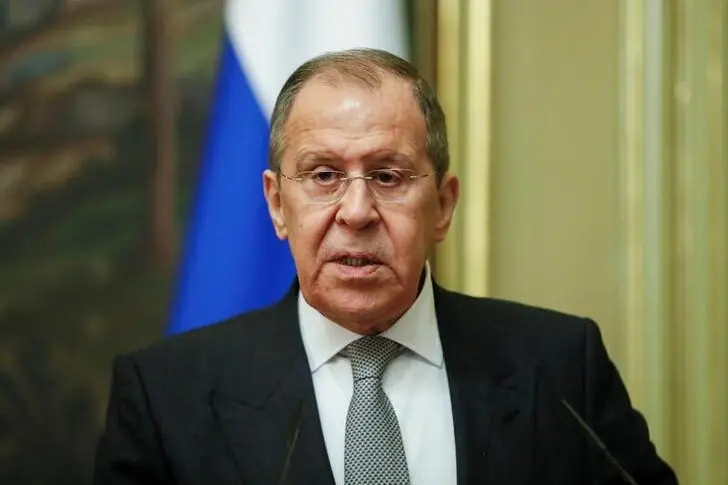PHOTO
Over the last month or so, the shadow of Russian Foreign Minister Sergey Lavrov has loomed large across the Middle East. In March, he visited the UAE, Saudi Arabia and Qatar. He was soon back in the region, visiting Egypt and Iran on April 12-13.
Russia became a key player in the Middle East when it brought its armed forces into Syria in September 2015 to prevent externally sponsored regime change. Having achieved this fairly quickly, its diplomatic canvas has broadened to include all the regional states, with which it is building substantial ties in the areas of energy, economics and defense, while seeking to pursue regional peace and security.
During his visit to the Gulf, Lavrov promoted a UAE role in enhancing stability in Syria, which his Emirati counterpart Sheikh Abdullah bin Zayed Al-Nahyan strongly supported. The latter criticized sanctions on Syria and backed the country’s re-entry to the Arab League.
In Doha, Lavrov shaped the Russia-Turkey-Qatar troika to discuss peace in Syria as an initiative to supplement the Astana process. Turkey and Qatar could jointly promote the settlement of the Idlib issue, where a few thousand Turkish-backed extremist elements are embedded within a 3 million-strong civilian population.
Lavrov’s most important interactions were in Saudi Arabia, with Crown Prince Mohammed bin Salman and Foreign Minister Prince Faisal bin Farhan. These meetings took place against the background of some uncertainty relating to the new US administration’s position on regional security issues.
In this scenario, Russia can play the useful role of a “balancer” in respect of the Kingdom’s two major competitions — with Turkey and Iran — by facilitating dialogue between them. Once mutual confidence between estranged neighbors is achieved, Russia will seek to obtain Middle East stability through a new regional security architecture shaped consensually by the area’s nations acting in concert.
As in the case of other Gulf countries, Russia’s agenda with Saudi Arabia is buttressed by substantial bilateral ties based on trade, including grain exports, and defense cooperation, besides being partners in the OPEC+ dialogue that ensures stability in the world’s energy market.
Lavrov’s foray to the Gulf states in March was complemented by his visits to Egypt and Iran in April. Though some commentators have seen the Cairo visit as a deliberate rebuke to Turkish President Recep Tayyip Erdogan, who was meeting the Ukrainian president in Istanbul at the same time, the outreach to Egypt was important in itself.
Russia has consolidated its defense relations with Cairo through the sale of military hardware, including fighter jets, tanks, attack helicopters and missile systems, as well as regular joint exercises. Besides this, Russia is working on a nuclear power plant and developing a gas field in the country, while it has also become a major grain supplier to Egypt. Russia’s ties with Egypt have been further strengthened by an Egyptian company emerging as the region’s first manufacturer of Russia’s coronavirus vaccine Sputnik V.
In Cairo, in terms of the regional agenda, Russia’s two main interests were Libya and Syria. Russia and Egypt were already partners in the Libyan conflict, opposing the Tripoli government that is backed by Turkey, and they have also now become partners in the country’s peace process. With regard to Syria, they are again on the same page, as Egypt has also consistently opposed regime change in Damascus.
Lavrov’s visit to Tehran was in the context of coordinating their positions on the revival of the Iran nuclear deal. The two countries agree that this should be kept separate from the other issues relating to regional security and that there should be a “synchronized approach” to the US lifting sanctions and Iran returning to the provisions of the Joint Comprehensive Plan of Action. In January, Russia and Iran had entered into an information and cybersecurity agreement that will boost Iran’s cyber defenses against hostile attacks, mainly from Israel.
While Russia backs Iran on the nuclear question, it is also sensitive to the security concerns of Israel and the Gulf Arab states and, hence, strongly advocates Tehran’s participation in a regional security conclave taking place within the framework of the peace plan that Moscow had floated in July 2019.
Though Ankara was not on Lavrov’s itinerary, ties with Turkey are an important part of Russia’s regional interests. While bilateral ties have blossomed in energy, the economy and defense, Turkey remains a difficult partner as it seeks to retain its strategic autonomy on regional issues and its partnership with the US, despite their many differences. It is likely that Joe Biden’s coolness toward the Turkish leader and Saturday’s recognition of the Armenian genocide of 1915 will push Ankara further into the Russian embrace.
There is a churn being seen in Middle East politics, with regional states asserting new interests, playing new roles, engaging with fresh challenges, and building alliances to serve ideological and/or security interests. As the US recedes from the Middle East landscape, Russia will emerge as the central figure in the regional cauldron and is likely to offer the best hope for peace and security.
- Talmiz Ahmad is an author and former Indian ambassador to Saudi Arabia, Oman and the UAE. He holds the Ram Sathe Chair for International Studies at Symbiosis International University in Pune, India.
Copyright: Arab News © 2021 All rights reserved. Provided by SyndiGate Media Inc. (Syndigate.info).





















